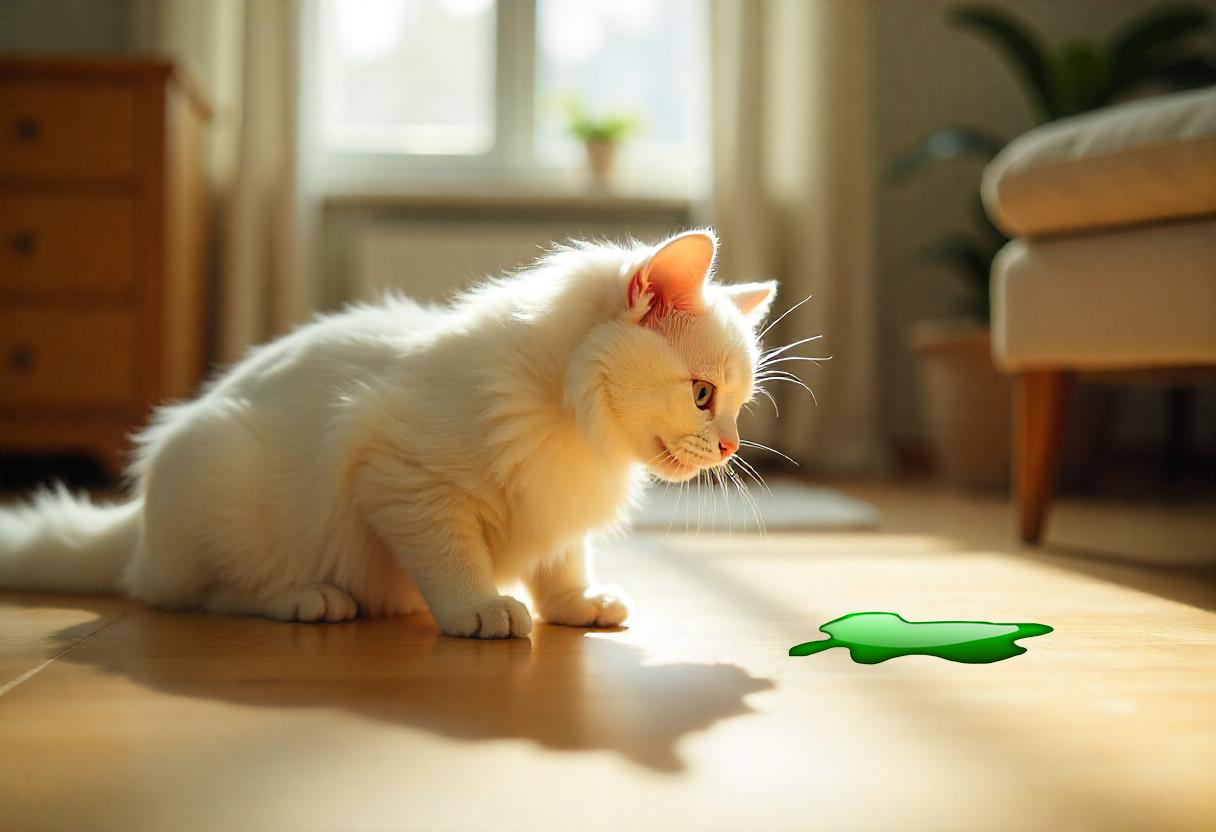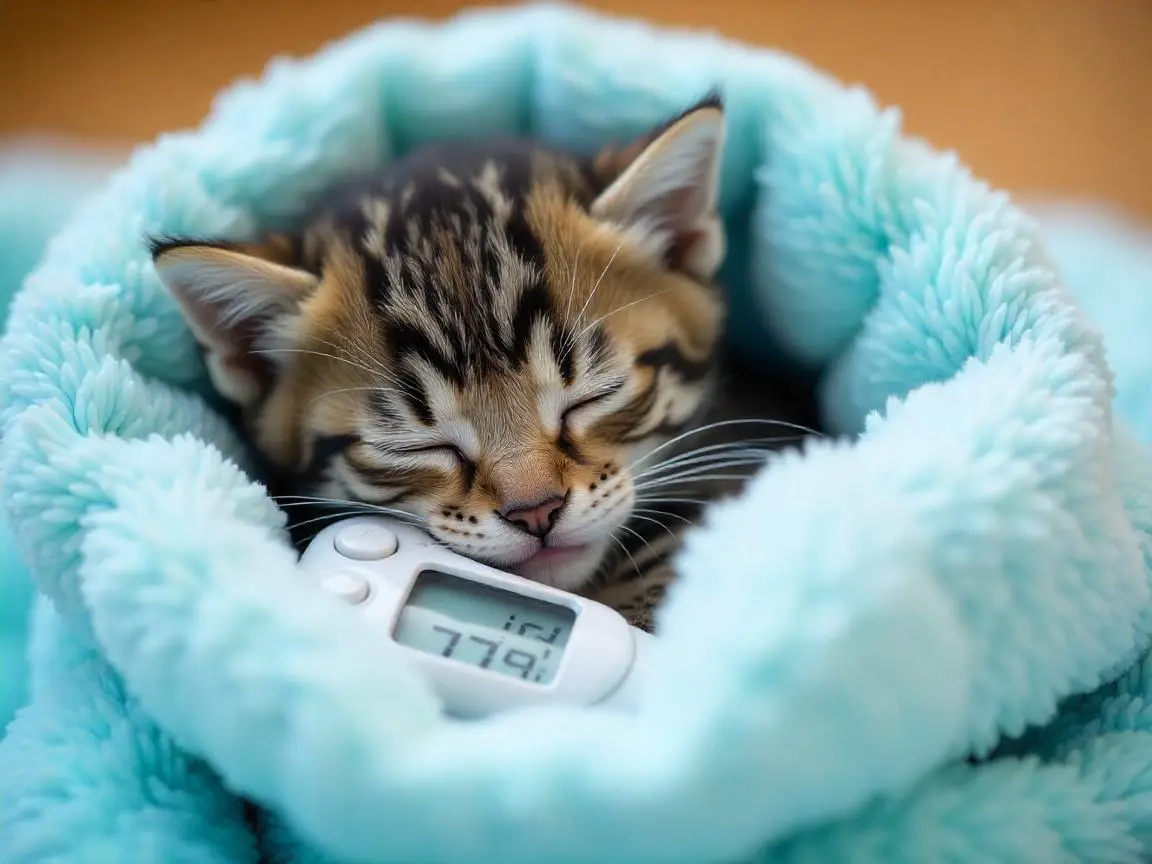If your cat has been throwing up now and then, you’re probably wondering—what’s causing it? As cat parents, seeing them vomit can feel alarming, especially when we don’t know if it’s something serious or just a one-time issue.
The truth is, there are many reasons why cats throw up. Sometimes it’s something simple like a change in food, and other times it might be linked to an underlying health condition. Knowing the difference can help you decide whether it’s something you can manage at home—or a situation that calls for a vet visit.
Common Reasons Cats Throw Up
Cats can vomit for several reasons. Here are a few possible causes:
1. Sudden diet change
Changing your cat’s food too quickly can upset their stomach. Cats have sensitive digestive systems, and when you switch to a new food without gradually mixing it with their old one, it can lead to vomiting. Their stomach needs time to adjust, so it’s best to introduce new food slowly over a week to avoid stomach issues.
2. Eating something they shouldn’t (like string, hair ties, or spoiled food)
Cats are curious by nature and sometimes eat things they’re not supposed to, like string, rubber bands, hair ties, or even spoiled food from the trash. These items can irritate their stomach or cause blockages, leading to vomiting. If you think your cat may have swallowed a foreign object, it’s important to contact your vet right away.
3. Parasites in the digestive system
Intestinal parasites like roundworms or hookworms can make your cat throw up. These parasites live in the digestive tract and can cause vomiting, diarrhea, weight loss, and a poor appetite. Regular deworming and check-ups with your vet can help prevent and treat this problem.
4. Viral infections
Cats can catch viruses that upset their digestive system, such as feline panleukopenia or feline coronavirus. These infections often cause vomiting, along with other symptoms like fever, diarrhea, and fatigue. A visit to the vet is needed for proper diagnosis and care if your cat shows multiple symptoms.
5. Toxins or plants that are harmful to cats
Some common household plants and chemicals are toxic to cats. Things like lilies, cleaning products, certain human medications, or insecticides can make your cat very sick and cause vomiting. Always keep these items out of reach and call your vet immediately if you suspect poisoning.
6. Hairballs
Hairballs form when your cat swallows hair during grooming. Most of the time, they pass through the digestive system, but sometimes they get stuck and are thrown up. Occasional hairballs are normal, but frequent vomiting may mean your cat needs help managing them—like brushing more often or using a hairball gel.
7. Kidney problems
Chronic kidney disease is common in older cats and can lead to vomiting, especially as waste builds up in the body. You may also notice weight loss, increased thirst, and more frequent urination. If your cat shows these signs, your vet can run blood and urine tests to confirm kidney issues and suggest a treatment plan.
8. Hyperthyroidism
Hyperthyroidism happens when a cat’s thyroid gland produces too much hormone, affecting their metabolism. This condition can cause vomiting, weight loss, increased appetite, and restlessness. It’s more common in older cats and needs a vet’s care to manage with medication or special diets.
9. Diabetes
Cats with diabetes may vomit due to unstable blood sugar levels or a serious condition called diabetic ketoacidosis. Other signs include drinking more water than usual, peeing more often, and losing weight despite a good appetite. Diabetes is manageable but requires proper diagnosis and care from your vet.
10. Inflammatory bowel disease (IBD)
IBD causes long-term inflammation in your cat’s digestive tract, leading to vomiting, diarrhea, and weight loss. It’s more common in middle-aged and older cats. If your cat has frequent digestive issues, your vet may recommend special diets or medication to manage the inflammation and reduce vomiting.
11. Tumors or growths in the digestive system
In some cases, vomiting can be caused by tumors or abnormal growths in your cat’s stomach or intestines. These can block digestion or irritate the stomach lining. If vomiting is ongoing and doesn’t improve, your vet might suggest X-rays or ultrasounds to check for anything unusual inside.
If your cat only vomits occasionally and acts normal afterward, it may not be urgent—but regular vomiting should never be ignored. Healthier cats might throw up once in a while, but anything more than once a week, or especially multiple times in a day, is a red flag.
Could It Be the Food?
A new diet is one of the most common reasons cats throw up. Even something as small as a new flavor of kibble or a new treat could upset their stomach. If you’ve recently introduced new food or treats, keep an eye out. The reaction might show up days later, not right away.
Cats with sensitive stomachs may not handle sudden food changes well. That’s why it’s always best to transition slowly—mixing a little of the new food with the old over several days.
If your cat hasn’t eaten anything new or odd recently, there may be another health issue involved, and a vet visit is the best next step.
Is It Vomit or a Hairball?
It’s easy to confuse vomiting with a cat hacking up a hairball—especially since both involve gagging and loud noises. But there’s a difference.
Hairballs (the medical term is trichobezoars) are mostly made of swallowed fur that doesn’t digest properly. If what your cat brings up looks like a soggy tube of hair with only a little fluid, it’s probably just a hairball.
Actual vomit usually includes things like food, bile (a yellow liquid), foam, or mucus—and may only have a few strands of hair.
If your cat seems tired, stops eating, or vomits more than one or two hairballs a day, it’s no longer just a hairball issue. In that case, it’s time to contact your vet.
Should You Ever Make Your Cat Throw Up?
Short answer: No. Never try to make your cat vomit at home.
Some people search online and come across ideas like using hydrogen peroxide, but this is dangerous for cats. It can severely irritate their stomach and cause more harm than good.
If you think your cat swallowed something toxic or dangerous, call your vet or take them to an animal emergency clinic right away. They have safe methods to help your cat if vomiting is necessary.
What Can You Do to Help Your Cat Stop Vomiting?
Depending on the cause, there are a few ways you can help prevent your cat from throwing up again—but always consult your vet first to make sure it’s the right step for your cat.
1. Keep Their Diet Consistent
Avoid switching your cat’s food suddenly. If you do need to change it, do it slowly over 7–10 days, mixing the old food with the new one bit by bit. Try to avoid giving too many treats or human foods.
2. Use Hairball Control Products
If hairballs are the issue, a cat hairball gel or oral laxative can help move things along more smoothly. These usually come in tasty flavors your cat won’t mind. A common trick is to put a little gel on their paw—they’ll lick it off while grooming!
3. Try Medication (With Vet Guidance)
If your cat’s vomiting is caused by inflammatory bowel disease or a long-term condition, your vet may recommend medications like prednisone. Always ask before starting anything new, as some medications can have side effects.
When Should You See the Vet?
Here are some signs that vomiting could be part of something more serious:
-
Vomiting more than once a day
-
Lethargy or low energy
-
Not eating or drinking
-
Diarrhea
-
Weight loss
-
Blood in vomit
-
Gagging or retching with nothing coming up
If your cat shows any of these symptoms, don’t wait. A quick checkup can catch problems early and give your kitty a better chance at recovery.
Final Thoughts
Cats may throw up for many reasons—some harmless, others more serious. Watching their behavior, monitoring their diet, and staying in tune with any changes can help you figure out if it’s time to call the vet or simply wait it out.
When in doubt, always play it safe and talk to your vet. They’ll help you find out what’s really going on and how to make your furry friend feel better.



